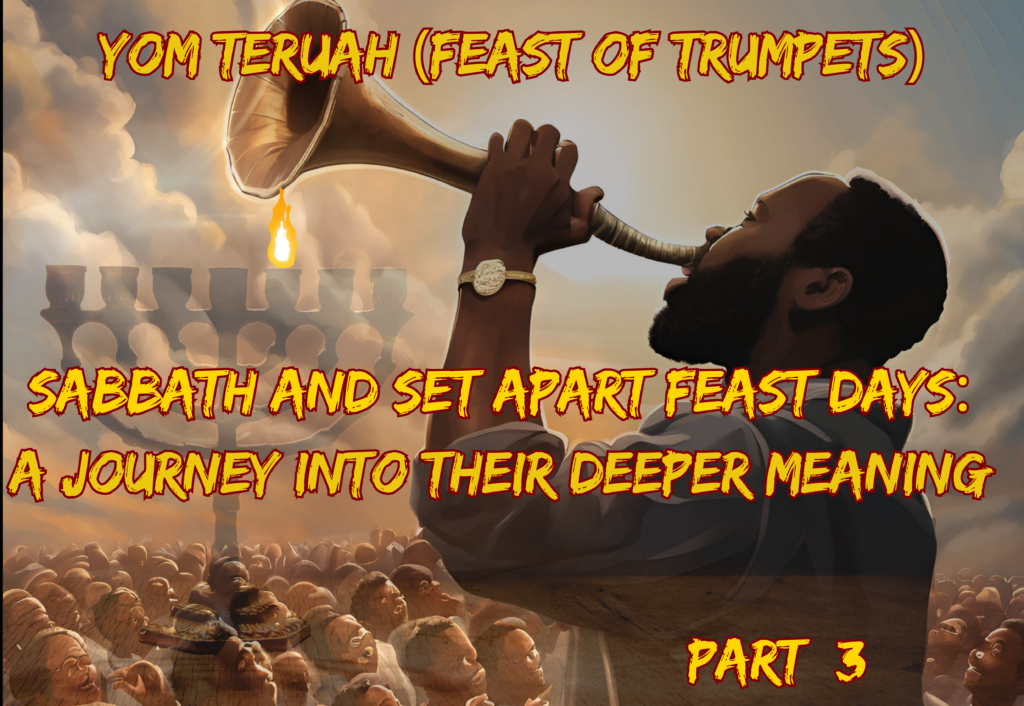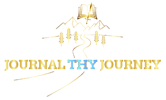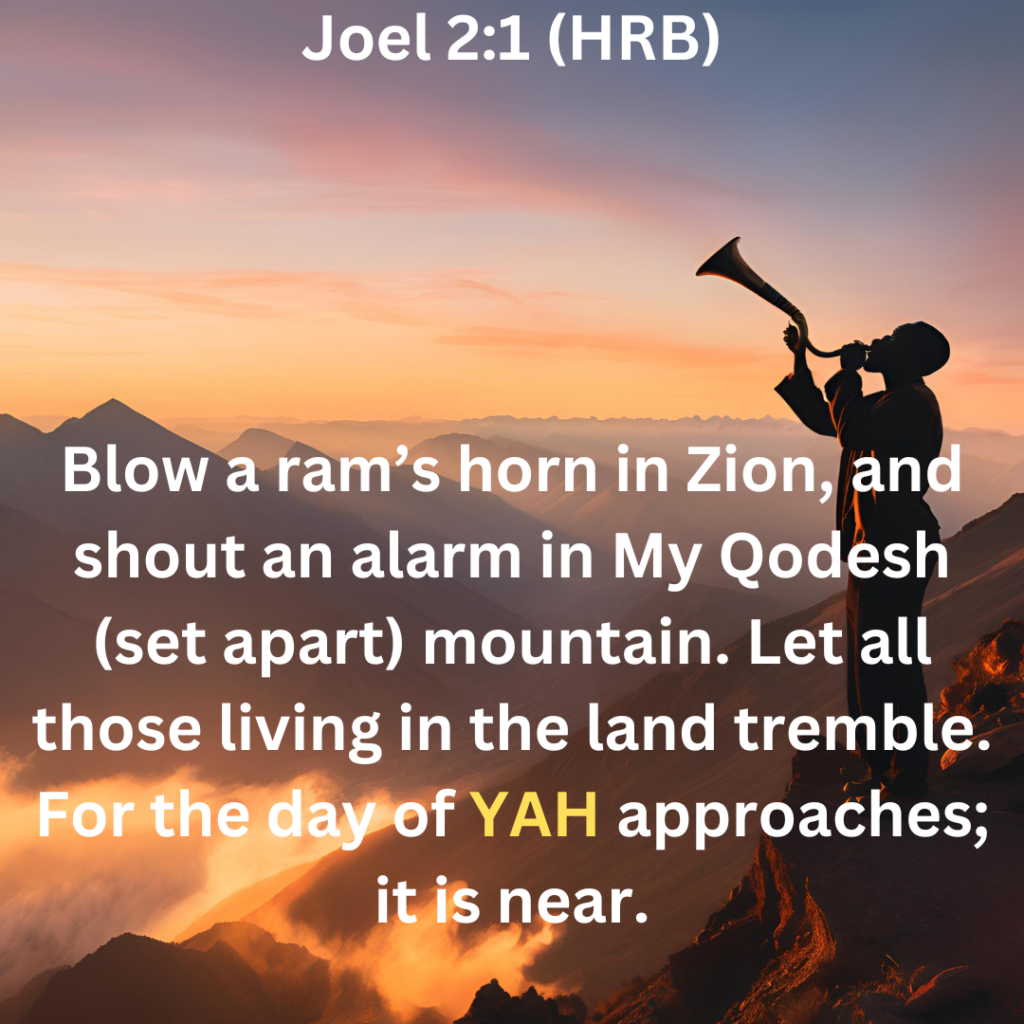
The Fifth Feast Day
Yom Teruah or Feast of Trumpets
(High Shabbat)
Yom Teruah, also known as the Feast of Trumpets or the Feast of Clamoring, must be observed as commanded in Leviticus 23:23-25 on the first day of the 7th month (Ethanim – 1 Kings 8:2).
It Is From This Ceremony That the Feast of Trumpets Draws Its Name!
And 𐤉𐤄𐤅𐤄 spoke to Moses, saying, Speak to the sons of Yahshar’el, saying, In the seventh month, on the first of the month, a Holy Day Sabbath shall be to you, a memorial acclamation of the resounding of TRUMPETS, a holy gathering. You shall do no laborious work and you shall bring a fire offering to 𐤉𐤄𐤅𐤄.
Leviticus 23:23-25 (HRB)
In this and all Food for Thoughts I recommend you read the Scripture(s) provided and the entire chapter they are from to obtain more insight.
The Feast of Trumpets initiates the final events and feast days in 𐤉𐤄𐤅𐤄‘s plan. It also marks a time of introspection and preparation. It serves as a wake-up call for us to examine our lives, repent, and return to 𐤉𐤄𐤅𐤄 while leading up to Yom Kippur, the Day of Atonement.
What the Feast is Not
The Feast of Trumpets should never be celebrated or referred to as Rosh Hashanah (beginning of the year or head of the year), as the Jewish do, which is a form of syncretism. Rosh Hashanah, over time, changed the focus from a solemn day of repentance, trumpet blasts, and anticipation of 𐤉𐤄𐤅𐤔𐤏 (𐤉𐤄𐤅𐤔𐤏 or Yahshua) return to a celebratory day. A day in which they celebrate a false New Year, false head of month (see note below), and disregard the prophetic return 𐤉𐤄𐤅𐤔𐤏, whom they reject.
Note: According to the Bible, the New Year is determined by the first new moon that occurs after the vernal equinox. And Elohim said, Let light sources be in the expanse of the heavens, to divide between the day and the night. And let them be for signs and for (Holy day) seasons, and for days and YEARS (Genesis 1:14). The First month is called Aviv (Duet 16:1) and 𐤉𐤄𐤅𐤄 left instruction in the Torah for that as well. This month shall be the head of months for you. It shall be the first of the months of the year for you (Exodus 12:2). Rosh Hashanah (Ezekiel 40:1) is tied only to the Jubilee year (every 50th year) when the shofar is sounded on Yom Kippur to announce restoration and freedom due to it being a Jubilee year, (Leviticus 25:9, 25).
Comparison of the Two:
- Yom Teruah: In the Bible, the first day of the seventh month (Ethanim) is the Feast of Trumpets (Yom Teruah), a biblical Holy Day mentioned in Leviticus 23:23-25 and Numbers 29:1. It is a day of shofar blasts, a call for repentance, remembrance, and a prophetic symbol of the future return of 𐤉𐤄𐤅𐤔𐤏 Ha-Mashiach. The day marks the start of introspection and preparation leading up to Yom Kippur, the Day of Atonement.
- Rosh Hashanah: Over time, Jewish rabbinical tradition developed Rosh Hashanah as the Jewish New Year and associated it with the same day (the first day of the seventh month). This adaptation of the day gradually shifted its focus from the biblical call to repentance and prophetic meanings to a more commemorative and reflective observance. It became a time to celebrate the world’s creation and new year, to reflect on one’s deeds over the past year, and to pray for a good new year.
𐤉𐤄𐤅𐤄 (The Name of Our Creator)
𐤉𐤄𐤅𐤔𐤏 (The Name of the Son – Yahusha or Yahshua)
Shabbats and Feast Days begin at sundown and conclude at the following sundown
Prophetic Significance of the Feast of Trumpets in 𐤉𐤄𐤅𐤄‘s Plan
The Feast of Trumpets is much more than a historical or ceremonial observance; it is deeply connected to the unfolding of 𐤉𐤄𐤅𐤄‘s ultimate plan for humanity. You can see this in the intricacy of 𐤉𐤄𐤅𐤄‘s choosing of the month. 𐤉𐤄𐤅𐤄 could have chosen any month, but He chose the seventh to underline the perfection of His timing and the elegance of His symbolism, with the Feast of Trumpets mirroring the seven trumpet blasts of Revelations. The number seven represents perfection and completion in Scripture, making this feast even more significant in the unfolding of His redemptive plan.
The Feast of Trumpets not only serves as a call to repentance and introspection but also carries deep prophetic meaning, pointing forward to the ultimate gathering of 𐤉𐤄𐤅𐤄‘s people at the end of the age, when 𐤉𐤄𐤅𐤔𐤏 returns to establish the Kingdom of 𐤉𐤄𐤅𐤄 (1 Corinthians 15:24-28, Matthew 6:10, John 5:19-23, Revelation 11:15).
Additionally, the Feast of Trumpets foreshadows the terrible tribulation that will precede 𐤉𐤄𐤅𐤔𐤏‘s return—a time of unprecedented upheaval marking the final stages of humanity’s redemption. It is essential to understand that both Yahshar’el and the grafted-in branches will still be present on earth during this time of great tribulation. Contrary to popular belief within Christianity, there is NO pre-tribulation rapture mentioned in Scripture. This doctrine is a deception that distorts the true teachings of the Word. Rapture theology falsely claims believers will be spared from the tribulation and that the Mark of the Beast will come after the supposed rapture. Unfortunately, this false belief has already deceived many. It will undoubtedly lead many more to think they will escape hardship, leaving them unprepared and vulnerable to receiving the Mark of the Beast.
Meanings of the Trumpets
(Tribulation, Return of 𐤉𐤄𐤅𐤔𐤏, and Gathering of the Elect)
Trumpets were sounded to:
- Announce 𐤉𐤄𐤅𐤄’s festivals (Numbers 10:10, Leviticus 23:24, 2 Chronicles 5:12)
- Call His people to assembly (Numbers 10:2-3, 4-7, Leviticus 25:9), and proclaim the reign of a new king (1 Kings 1:34-39, 2 Samuel 15:10).
- Alarm, Warn, Invade (Jeremiah 4:19-21, Joel 2:1, Joshua 6:4-5).
The piercing blast of the trumpet struck fear in ancient Yahshar’el, signaling the urgency and danger of approaching conflict. The Feast of Trumpets is a crucial biblical observance tied to prophetic trumpet blasts that mark the beginning of the final events.
Blow a ram’s horn in Zion, and shout an alarm in My holy mountain. Let all those living in the land tremble. For the day of YAHWEH approaches; it is near.
Joel 2:1 (HRB)
In this and all Food for Thoughts I recommend you read the Scripture(s) provided and the entire chapter they are from to obtain more insight.
The Tribulation (The Time of Trouble):
- The Tribulation is a time of intense hardship, persecution, and divine judgment leading up to the return of 𐤉𐤄𐤅𐤔𐤏. It will be a period marked by suffering, deceit, and the rise of the Anti-Mashiach (Antichrist). 𐤉𐤄𐤅𐤄 commanding the Feast of Trumpets to be celebrated in the seventh month shows His prophetic foreshadowing of the seven trumpet judgments in the Book of Revelation, which signal the outpouring of 𐤉𐤄𐤅𐤄‘s wrath on the earth. These seven trumpet blasts announce the end of this age and the final judgment, calling attention to the rise of global turmoil and the culmination of 𐤉𐤄𐤅𐤔𐤏‘s return. The trumpets are both warnings of coming judgment and a call for repentance, echoing the urgency of the Feast of Trumpets as a day for the people of 𐤉𐤄𐤅𐤄 to prepare for His coming and the tribulation that precedes it.
- Matthew 24:21-22 – 𐤉𐤄𐤅𐤔𐤏 warns of a time of tribulation “such as has not happened from the beginning of the world until now, no, nor ever will be.”
- Revelation 8:6-9:21 describes the seven trumpet judgments that are released upon the earth. Each trumpet blast signals a specific judgment or event that causes turmoil and devastation. These trumpet judgments mark the intensifying of 𐤉𐤄𐤅𐤄‘s wrath and the worsening of the tribulation.
The tribulation is a period where 𐤉𐤄𐤅𐤄‘s people are tested, and the nations face the consequences of their rejection of Him and His People Yahshar’el (Jeremiah 46-51).
The Return of 𐤉𐤄𐤅𐤔𐤏 (Second Coming):
- 𐤉𐤄𐤅𐤔𐤏‘s Return happens after the tribulation and will announced by the trumpet blast. The return of 𐤉𐤄𐤅𐤔𐤏 is both a judgment and a gathering of His people.
- Matthew 24:30-31 – “And then the sign of the Son of Man will appear in the heavens. And then all the tribes of the land will wail. And they will see the Son of Man coming on the clouds of Heaven with power and much glory. And He will send His cherubs with a great sound of a large trumpet, and they will gather His chosen ones from the four winds, from one end of the sky to the other.“
- 1 Corinthians 15:52 – “In a moment, in the blinking of an eye, at the last trumpet; for a trumpet will sound, and the dead will be raised incorruptible, and we shall all be changed.“
- Revelation 11:15 – “And the seventh cherub trumpeted. And there were great rumblings of thunder saying, The kingdoms of this world have become our Elohim’s, even of His Messiah; and He shall reign forever and ever.“
The seventh trumpet (the last trumpet) marks the ultimate victory of 𐤉𐤄𐤅𐤔𐤏 and the establishment of 𐤉𐤄𐤅𐤄‘s Kingdom on Earth. The trumpet sound at His return is the signal for the gathering of the elect and the commencement of 𐤉𐤄𐤅𐤔𐤏‘s reign.
The Gathering of the Elect:
- The gathering of the elect (Yahshar’el Deut 7:6, Isaiah 45:4 and Grafted-in wildbranches Romans 11:17-24) is when 𐤉𐤄𐤅𐤔𐤏 returns and calls His people to Himself. This follows the trumpets’ announcement of His arrival and is linked directly to the trumpet sound in scripture.
- Matthew 24:31 speaks of the angels gathering the elect after the trumpet sounds: “And He will send His cherubs with a great sound of a large trumpet, and they will gather His chosen ones from the four winds, from one end of the sky to the other.”
- 1 Thessalonians 4:16-17 – “Because the Master Himself shall come down from Heaven with a commanding shout of an archangel’s voice, and with the trumpet of 𐤉𐤄𐤅𐤄. And the dead in Messiah will rise again first. Then we who remain alive will be caught up together with them in the clouds to meet with our Master in the air. And so we will always be with our Master.”
The trumpet that sounds at the return of 𐤉𐤄𐤅𐤔𐤏 signals the resurrection of the dead and the gathering of His people from all corners of the earth. This is the moment when the faithful are redeemed, and 𐤉𐤄𐤅𐤔𐤏‘s Kingdom is established.
What to Do on Yom Teruah (Feast of Trumpets):
- Rest and Worship: As a High Shabbat, no regular work is permitted on this day. It is a day of rest and sacred observance, where Yahshar’el and Grafted-in believers are called to cease from their usual labor and dedicate the day to spiritual reflection and worship.
- Holy Gathering: It is a time to gather with fellow believers for fellowship and worship, aligning with the biblical call for a “holy convocation” (Leviticus 23:24).
- Blowing of the Trumpets: The sound of the shofar (ram’s horn) plays a central role in Yom Teruah. It is a symbol of 𐤉𐤄𐤅𐤄‘s call to His people to gather together, to reflect on their lives, repent, and prepare spiritually for the coming judgment and redemption. The trumpets also have eschatological significance, pointing to the future gathering of the faithful at the return of 𐤉𐤄𐤅𐤔𐤏 and the resurrection of the dead, as mentioned in 1 Corinthians 15:52.
- Feasting and Cooking: Cooking is allowed on the Feast of Trumpets.
- Introspection and Repentance
Conclusion
The trumpets throughout the prophetic timeline are signals of judgment, victory, and gathering, each marking significant moments in the unfolding of 𐤉𐤄𐤅𐤄‘s redemptive plan, leading to the return of 𐤉𐤄𐤅𐤔𐤏 and the restoration of 𐤉𐤄𐤅𐤄‘s Kingdom.
We will continue with the next feast or Feast(s) next week 𐤉𐤄𐤅𐤄 willing.
By: David Edwards – Hallelu-YAH – Praise YAH – Praise 𐤉𐤄𐤅𐤄


